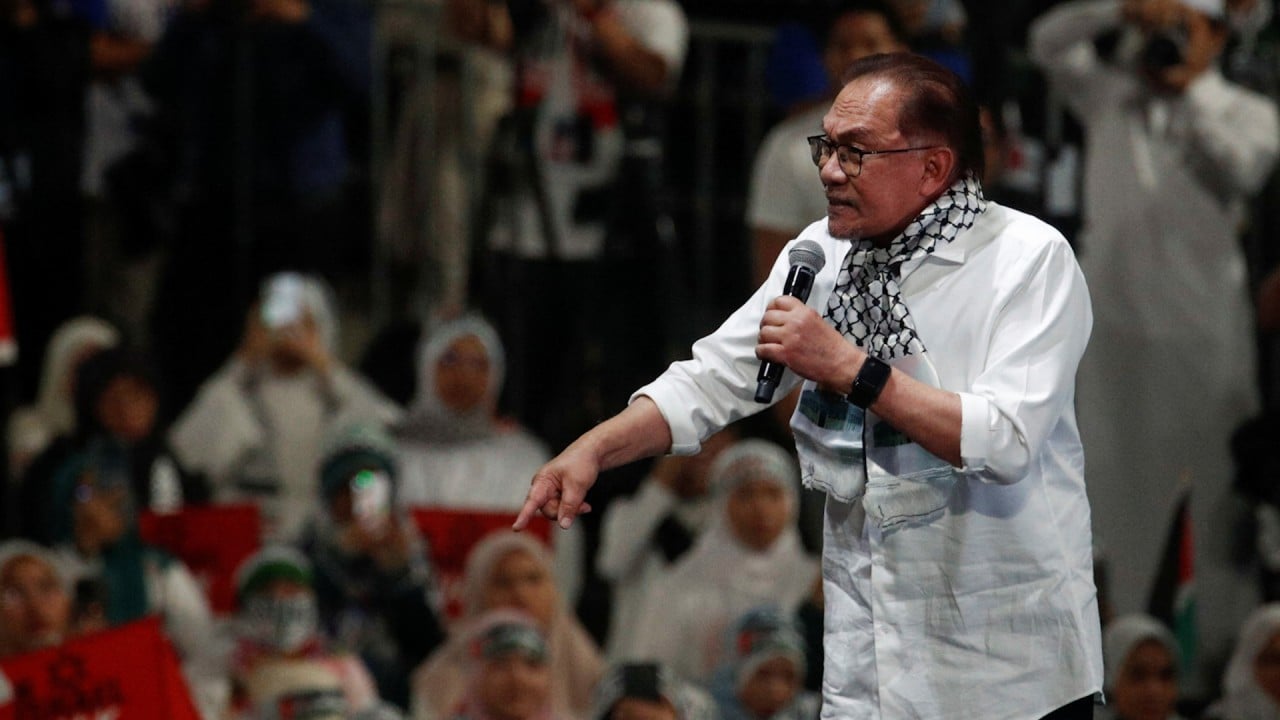
Malaysia’s support for Palestinians will always be firm amid politicisation among rival parties
- Geographical distance from the conflict zone allows Malaysia to be more absolute in its stance on Palestinian statehood
- A surge in social media posts on the Palestinian crisis will have a long-term impact on global opinions
Thus, in some ways, what is currently coming out of Kuala Lumpur is a continuation of the same stance observable every time escalations occur between the two conflicting sides. In other ways, however, there are subtle differences that underscore a ratcheting up of the rhetoric and posture and may hold broader significance.
Malaysia will defy US pressure to label Hamas terrorists: PM Anwar
Cynics will point to the distinctly performative aspect of the entire Malaysian enterprise vis-à-vis Palestine, especially considering the limited observable effects these efforts have had on the state of affairs in Gaza, at least thus far. That may be an incomplete reading, not least since the diplomatic interventions required to change events on the ground are far larger than what Malaysia can accomplish alone. The question ought to be less about “What has Malaysia achieved?” and more about the perennial “Why is there not a more collective and coordinated intervention by a coalition of countries?”
Nonetheless, even performative indignation merits examination, if nothing else to consider how this moment – and Malaysia’s meeting of it – may prove to be a unique inflection point in anticipating longer-term trends.
For example, we should note the far-reaching and multitudinous impact of social media’s proliferation on the war of narratives, pun intended. A new generation of media-savvy – often Palestinian – commentators and communicators have been challenging the usual portrayals and tropes on global news networks, and are able to crystallise arguments that most Malaysians already intuitively believe.
More visually and distressingly, some of the clips on social media platforms need no interlocutor to convey the horror of genocide occurring practically in real-time. Additionally, algorithms serve to sharpen the divide – in the tribalism of a war this emotive, we are likely to see more reaffirming content and less of any opposing or even mitigating positions.
In other words, the scale of death and destruction made vivid to the world by the unprecedented reach and viscerality of digital content means that passions are more acute for more people than usual. If the tragedy continues for much longer, and these same social media properties contribute to a certain permanence of such heightened passions, the implications may reverberate for years.
Malaysian teens rally for Palestinians on Roblox amid censorship concerns
Crucially, the present atrocities are also occurring at a time when multipolarity is the new reality, and especially so for the part of the world Malaysia is in.
‘We have great hopes’: Singapore, Malaysia to develop border economic zone
Finally, while deciphering the actions and rhetoric observed in Malaysia should not begin and end with the country’s domestic political considerations, it regrettably remains a fundamental part of understanding what happens here and anticipating how it might evolve.
Already, there are accusations being hurled back and forth about rivals either not doing enough, going overboard or milking the issue for attention. Expect the politicisation to continue as all parties compete for Malay-Muslim approval while keeping the sizeable non-Muslim minority either untroubled or on board by rightly highlighting the humanitarian dimensions of this tragedy. On that score, Malaysians will hope that amidst all the noise and complex and adulterated motivations, the humanitarian assistance they send – emphatically not a performative intervention – will find its way to the human beings who need it most urgently.
Shahril Hamdan was the Information Chief and Deputy Youth Chief of Umno before his suspension from the party in January 2023. In his post-political career, he co-hosts a current affairs podcast “Keluar Sekejap” (“Out for the Moment”) alongside running a corporate advisory firm and his activities as a World Economic Forum Young Global Leader.


